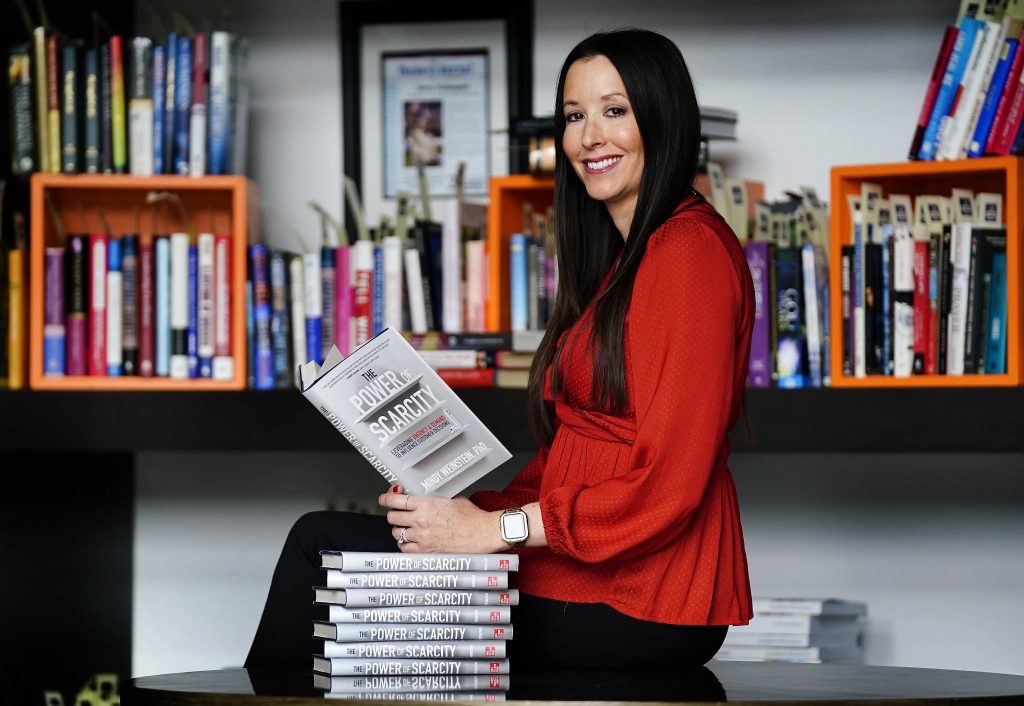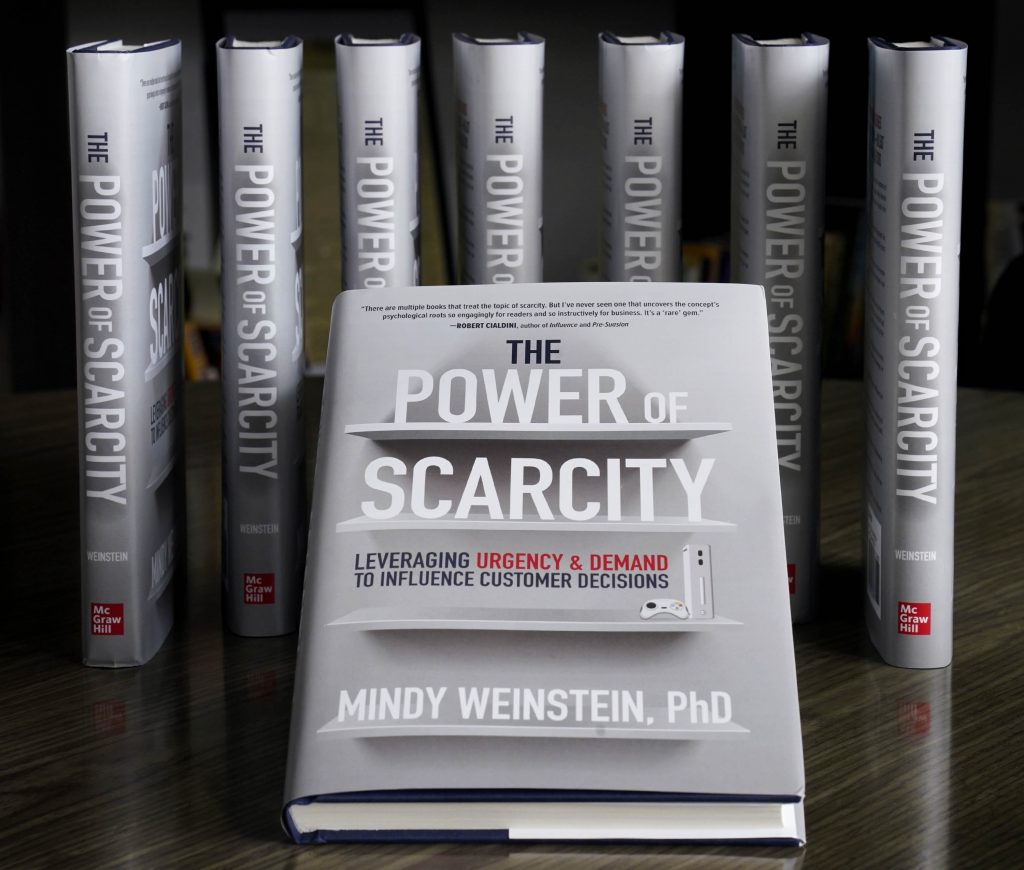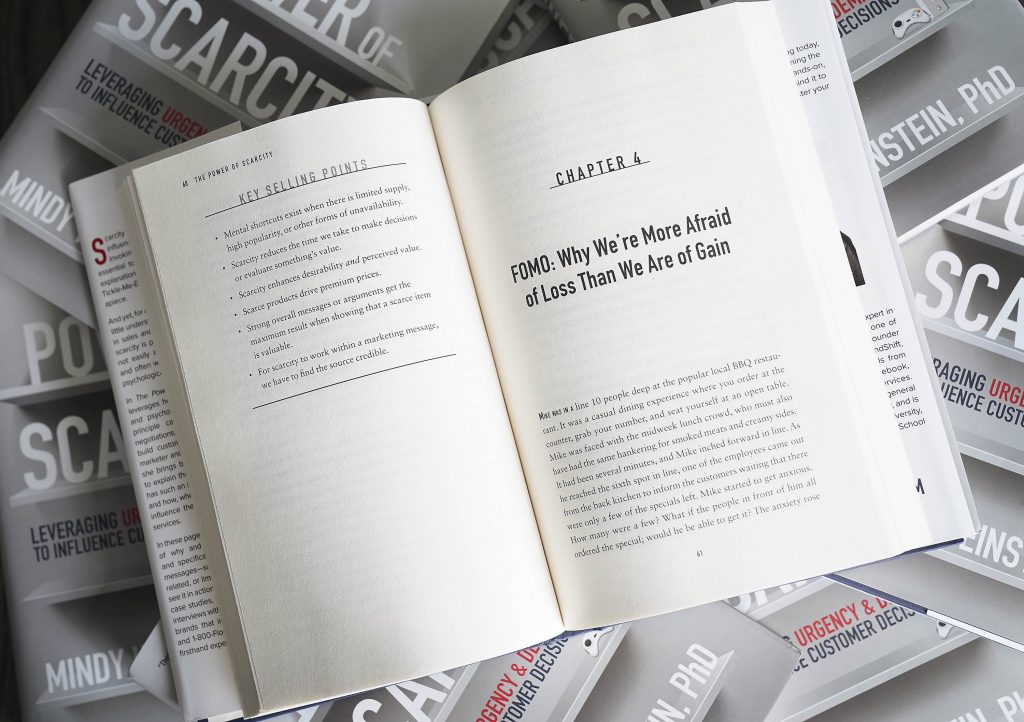
Photos by Ralph Freso
For most authors, the secret to a good book is simple: Find an interesting topic, research it well and know how to put words together.
But Dr. Mindy Weinstein has taken it three steps further, and that’s what made The Power of Scarcity: Leveraging Urgency and Demand to Influence Customer Decisions so highly anticipated before it was released Tuesday by McGraw-Hill.
She worked in marketing for decades, so she knows what drives sales.
She is a Colangelo College of Business instructor at Grand Canyon University, so she has had to find effective ways to teach marketing concepts.
It's a total tie to GCU. If I'm teaching students a complex topic, I have to break it down in a way that they're all going to understand.
Dr. Mindy Weinstein
And her research had to be thorough when she explored scarcity to earn her Ph.D. in General Psychology from GCU, so she understands what it means to fully immerse yourself in a subject.
“It’s a total tie to GCU,” she said. “If I’m teaching students a complex topic, I have to break it down in a way that they’re all going to understand.
“I took that same mentality with the book – there are so many psychological studies. They’re deep. Some of them are hard to understand. How can I take that, show a foundation and install a framework that goes beyond academics?
“I’m going to lose everyone if I just throw out studies, so I really focused my book on actual storytelling by including interviews with business executives. In the book, I talk about something in the real world, how it works, and then include a more practical application.”
And the result?
“The feedback I’ve been getting is that the book is really easy to understand.”
What makes it even more significant, CCOB interim Dean Dr. Allison Mason said, is that there aren’t a lot of women writing books about business.
“I am one of Dr. Weinstein’s biggest fans in this endeavor,” Mason said. “She is clearly passionate about the topic, and that shines through in her book as well as in the classroom when she is teaching our marketing courses.
“She is a perfect role model for our students. I’m looking forward to her future successes both inside and outside of the classroom.”

Weinstein’s endeavor is a classic confluence of coincidence and curiosity. She watched her dissertation on scarcity play out right before her eyes when she finished it in the middle of the pandemic and decided she wanted to transform her research into a book to educate others.
“The thing that interested me most was what motivates consumers,” she said. “I decided I wanted to do something associated with persuasion. Scarcity is so multilayered. It depends on who you’re trying to reach, what you’re offering.”
It’s all about building relationships and building community to increase sales, Weinstein learned. “It’s a bit of self-expression – ‘Look what I’ve got.’ It creates excitement,” she said.
In other words, waiting lists, limited-time offers and purposely constricted supplies can be a good thing for retailers. Look at Tesla. Or “Pumpkin Spice-flation.” Or McDonald’s Adult Happy Meals.
You can charge more for the product or, in the case of the Happy Meal toys, consumers can sell them on eBay for thousands of dollars. While informing customers about your product, you create a demand that can result in Facebook groups and word-of-mouth networks that don’t cost you a dime.

Another CCOB instructor, Dr. Chuck Jarrell, was the content expert on Weinstein's dissertation committee and thought it was a nice topic – but hardly a show-stopper – when she brought it to him. That was before the pandemic, however. Now he sees scarcity everywhere, including in services such as restaurants and hotels that can't hire enough workers.
"Scarcity is a real issue right now," he said. "Who knows how long it’s going to be with this? Probably for some time in some industries. It’s a really, really interesting and relevant topic made more so by COVID."
While doing her dissertation, Weinstein learned that scarcity and product drops speak to a certain person.
Scarcity is a real issue right now. ... It's a really, really interesting and relevant topic made more so by COVID.
Dr. Chuck Jarrell, CCOB instructor and content expert for Weinstein's dissertation
“It’s really something that’s primal in us,” she said. “Whenever you look at governments and empires that had power, they had control of scarce resources. When you look back to our early ancestors, it’s all about survival with scarce resources. We’re so hardwired to overcome scarcity. It’s just in us. It elicits those feelings.
“When I was doing my academic research, what was blowing me away is this wasn’t just things in a focus group or questionnaires. Researchers would hook people up to MRIs and watch brain activity when faced with something that’s scarce. It could be with anything, such as an auction simulation.
“Then you can see how the brain starts to interact. It bypasses the normal decision-making parts of the brain and goes straight to the decision. Scarce? Oh, take quick action. Scarce? Take a mental shortcut. Scarce? Valuable. It’s hard to argue with what your brain’s doing.”
Weinstein pointed to a gigantic cup on her desk. She had noticed that a friend had one and learned that the product had been discontinued, but bloggers begged the company to make more. Before long, she had signed up for text message alerts … and now she has a cup of her own.
“I’ve studied scarcity academically, I’ve written about it, I am a marketer and I still fall for scarcity tactics,” she said, laughing. “When I bought that cup I thought, ‘I know what’s happening to me right now, but I’m still going to do it.’ That’s how powerful it is.”
And it’s powerfully good for a company, she said, as long as it’s honest.
“That was a big warning in my book – you don’t want to be misleading. One, that’s not ethical, and it defeats all of this because your short-term revenue gain is not going to work in the long run because you’re going to lose customers, and people talk. There are easy things that businesses can do, but it always has to be aboveboard.”
The same goes for, say, consultants who restrict their client base. Weinstein does that sort of work with her company, Market MindShift.
“There’s nothing wrong with telling a prospect, ‘I have only so much time.’ You’re being honest. It’s just the way it is,” she said.
Weinstein estimates that it took her about six months to write “The Power of Scarcity.”
She was excited when McGraw-Hill picked it up so quickly after her literary agent pitched it. She’s equally amazed that so many media are lined up to interview her about it.
But maybe she shouldn’t be surprised at all. Because there’s another key to good writing, and she has captured it with this book.
“I really like the topic,” she said.
No wonder so many people can scarcely wait to read about it.
Contact Rick Vacek, Senior Manager for Internal Communications, at (602) 639-8203 or [email protected].
****
Related content:
GCU News: They're buying into instructor's marketing acumen
GCU News: Built for this: Jerry Colangelo's influence on GCU















